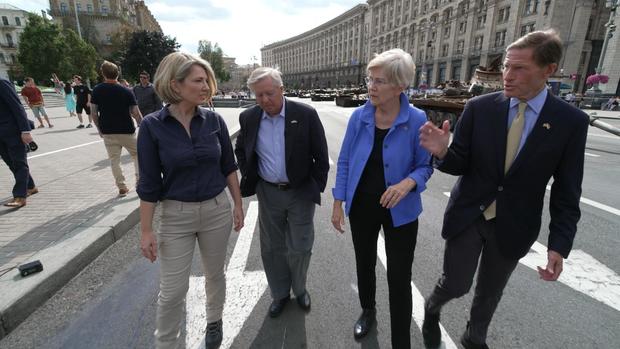U.S. Contemplates $20 Billion Aid for Ukraine Amid Budget Battle
As the Biden administration seeks approval for an additional $20 billion in aid to Ukraine, a fierce debate is unfolding in Washington, D.C. over whether to allocate these funds. The United States has already dispatched over $70 billion worth of aid to Ukraine since the Russian incursion across its borders last year. However, the latest request is sparking disagreements among lawmakers, with some advocating for the cessation of all funding and others demanding stricter oversight.
In an effort to shed light on how American taxpayers’ money is being used to support the Ukrainian conflict, a CBS News team ventured into Ukraine to investigate the allocation of these funds and the oversight mechanisms in place.
Their journey began 15 miles from the eastern Ukrainian front line, where U.S.-manufactured Bradley fighting vehicles, robust steel-clad machines, were concealed within a forest. These vehicles, originally designed to safeguard American infantry troops, now serve the same purpose for Ukrainian soldiers. Despite surviving landmines and shrapnel from Russian missiles, these Bradleys are lauded as life-saving assets by Ukrainian forces.
The United States has supplied 186 Bradleys to Ukraine at a cost of approximately $2 million each, significantly contributing to the defense of the country.
Lieutenant Oleksandr Shyrshyn, a former sales manager and a father of two, enlisted in the Ukrainian military on February 24th, 2022, the very day Russia invaded Ukraine. He attested to the fear that American weapons instilled in the Russian military, emphasizing their effectiveness in identifying and neutralizing Russian forces.
The U.S. has committed over $43 billion in military aid to Ukraine since the Russian invasion, an amount equivalent to approximately 5% of the American defense budget. European countries have collectively contributed around $30 billion to the cause.
American military support extends beyond weaponry, with American rocket launchers reaching deep into Russian-occupied Ukrainian territory, and the Patriot air defense system protecting millions of Ukrainian civilians from airstrikes.
Retired Lieutenant General Ben Hodges, former commander of the U.S. Army in Europe and current NATO advisor, expressed concerns that the Biden administration has not adequately communicated the benefits of supporting Ukraine to the American public. Hodges argued that countering Russia in Ukraine directly benefits every American, as Russia poses an enduring threat to both Europe and the United States.
Non-military aid from the U.S. is also essential for Ukraine’s stability. American taxpayers are financing various initiatives, including the purchase of seeds and fertilizer for Ukrainian farmers, covering the salaries of 57,000 Ukrainian first responders, and funding operations like the rescue dog training program.
The U.S. government is also supporting Ukrainian businesses, such as Tatiana Abramova’s knitwear company, which sustains over 70 families. These initiatives have helped Ukraine’s economy, which shrank by about a third due to Russia’s invasion, stay afloat.
However, Ukraine’s struggle with corruption remains a significant concern. Despite being the second most corrupt country in Europe, Ukraine has established mechanisms, such as online databases and monitoring, to ensure the proper utilization of American-supplied weaponry. U.S. officials are actively engaged in overseeing the aid’s distribution and have not reported any diversions of American weapons.
The Pentagon’s Inspector General, in a report last year, noted that the initial months of the war saw difficulties in monitoring weapons transfers due to the evacuation of American embassy staff. However, these issues have since been rectified.
Ukraine’s battle against corruption has intensified as the war continues, with a notable increase in cases involving non-military aid. This newfound intolerance for corruption underscores the understanding that corruption compromises Ukraine’s survival and endangers lives.
The ongoing conflict in Ukraine, now entering its third year, hinges on American support, and the outcome may depend on the willingness of American taxpayers to continue their financial backing.
As Ukrainian Lieutenant Oleksandr Shyrshyn emphasized, “Ukrainians pay with their lives. And I believe and I hope that their lives cost much more than money, much more than taxpayers’ money.”
Disclaimer: The views, suggestions, and opinions expressed here are the sole responsibility of the experts. No Prime Report Hub journalist was involved in the writing and production of this article.

